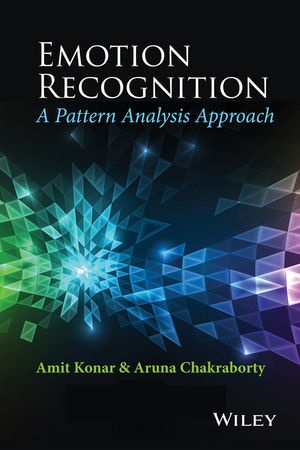Read more
"Written by leaders in the field, this book provides a thorough and insightful presentation of the research methodology on emotion recognition in a highly comprehensive writing style. Topics covered include emotional feature extraction, facial recognition, human-computer interface design, neuro-fuzzy techniques, support vector machine (SVM), reinforcement learning, principal component analysis, the hidden Markov model, and probabilistic models. The result is a innovative edited volume on this timely topic for computer science and electrical engineering students and professionals"--
List of contents
Preface xix
Acknowledgments xxvii
Contributors xxix
1 Introduction to Emotion Recognition 1
Amit Konar, Anisha Halder, and Aruna Chakraborty
1.1 Basics of Pattern Recognition, 1
1.2 Emotion Detection as a Pattern Recognition Problem, 2
1.3 Feature Extraction, 3
1.4 Feature Reduction Techniques, 15
1.5 Emotion Classification, 17
1.6 Multimodal Emotion Recognition, 24
1.7 Stimulus Generation for Emotion Arousal, 24
1.8 Validation Techniques, 26
1.9 Summary, 27
References, 28
Author Biographies, 44
2 Exploiting Dynamic Dependencies Among Action Units for Spontaneous Facial Action Recognition 47
Yan Tong and Qiang Ji
2.1 Introduction, 48
2.2 Related Work, 49
2.3 Modeling the Semantic and Dynamic Relationships Among AUs With a DBN, 50
2.4 Experimental Results, 60
2.5 Conclusion, 64
References, 64
Author Biographies, 66
3 Facial Expressions: A Cross-Cultural Study 69
Chandrani Saha, Washef Ahmed, Soma Mitra, Debasis Mazumdar, and Sushmita Mitra
3.1 Introduction, 69
3.2 Extraction of Facial Regions and Ekman's Action Units, 71
3.3 Cultural Variation in Occurrence of Different AUs, 76
3.4 Classification Performance Considering Cultural Variability, 79
3.5 Conclusion, 84
References, 84
Author Biographies, 86
4 A Subject-Dependent Facial Expression Recognition System 89
Chuan-Yu Chang and Yan-Chiang Huang
4.1 Introduction, 89
4.2 Proposed Method, 91
4.3 Experiment Result, 103
4.4 Conclusion, 109
Acknowledgment, 110
References, 110
Author Biographies, 112
5 Facial Expression Recognition Using Independent Component Features and Hidden Markov Model 113
Md. Zia Uddin and Tae-Seong Kim
5.1 Introduction, 114
5.2 Methodology, 115
5.3 Experimental Results, 123
5.4 Conclusion, 125
Acknowledgments, 125
References, 126
Author Biographies, 127
6 Feature Selection for Facial Expression Based on Rough Set Theory 129
Yong Yang and Guoyin Wang
6.1 Introduction, 129
6.2 Feature Selection for Emotion Recognition Based on Rough Set Theory, 131
6.3 Experiment Results and Discussion, 137
6.4 Conclusion, 143
Acknowledgments, 143
References, 143
Author Biographies, 145
7 Emotion Recognition from Facial Expressions Using Type-2 Fuzzy Sets 147
Anisha Halder, Amit Konar, Aruna Chakraborty, and Atulya K. Nagar
7.1 Introduction, 148
7.2 Preliminaries on Type-2 Fuzzy Sets, 150
7.3 Uncertainty Management in Fuzzy-Space for Emotion Recognition, 152
7.4 Fuzzy Type-2 Membership Evaluation, 157
7.5 Experimental Details, 161
7.6 Performance Analysis, 167
7.7 Conclusion, 175
References, 176
Author Biographies, 180
8 Emotion Recognition from Non-frontal Facial Images 183
Wenming Zheng, Hao Tang, and Thomas S. Huang
8.1 Introduction, 184
8.2 A Brief Review of Automatic Emotional Expression Recognition, 187
8.3 Databases for Non-frontal Facial Emotion Recognition, 191
8.4 Recent Advances of Emotion Recognition from Non-Frontal Facial Images, 196
8.5 Discussions and Conclusions, 205
Acknowledgments, 206
References, 206
Author Biographies, 211
9 Maximum a Posteriori Based Fusion Method for Speech Emotion Recog
About the author
Amit Konar is a Professor of Electronics and Tele-Communication Engineering, Jadavpur University, India, where he offers graduate-level courses on Artificial Intelligence and directs research in Cognitive Science, Robotics and Human-Computer Interfaces. Dr. Konar is the recipient of many prestigious grants and awards and is an author of 10 books and over 350 research publications. He offered consultancy services to Government and private industries. He served editorial services to many journals, including
IEEE Transactions on Systems, Man and Cybernetics (Part-A) and
IEEE Transactions on Fuzzy Systems.
Aruna Chakraborty is an Associate Professor with the Department of Computer Science and Engineering, St. Thomas' College of Engineering and Technology, India. She is also a Visiting Faculty with Jadavpur University, where she offers graduate-level courses on Intelligent Automation and Robotics, and Cognitive Science. Her research interest includes human-computer interfaces, emotional intelligence and reasoning with fuzzy logic.
Summary
A timely book containing foundations and current research directions on emotion recognition by facial expression, voice, gesture and biopotential signals This book provides a comprehensive examination of the research methodology of different modalities of emotion recognition.

